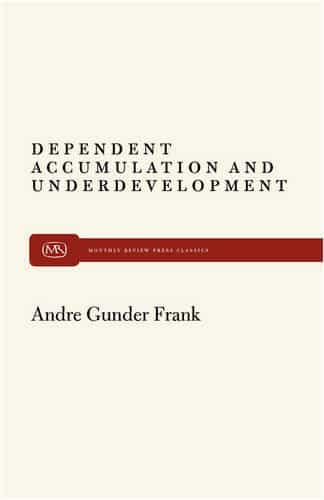Dependent Accumulation and Underdevelopment
$20.00
Paperback, 226 pages
ISBN-13: 978-0-85345-492-2
Released: January 1979
Why, while Europe, North America, and Australia have developed, have Africa, much of Asia, and Latin America remained underdeveloped? Andre Gunder Frank sets out to answer this basic question by showing how world capital accumulation has led to the differentiation of these regions within the single world-embracing economic system. Unequal exchange between regions, combined with the differential transformation of productive, social, and political relations within regions, has led to the capitalist development of some areas and to the underdevelopment of others.
The major periods of world capitalist development—mercantilist (1500–1770), industrial (1770–1870), and imperialist (since 1870)—are examined in three historical chapters. Each of these is followed by an analytical chapter which treats some important theoretical problems of capital accumulation, relationships of international trade or exchange, transformations of modes or relations of production, and their consequences for differential development and underdevelopment in each of these historical periods.
Frank challenges neoclassical “development” and neopositivist “modernization” theories which postulate that the developed countries of Europe and North America diffuse capital and social institutions or values down to the underdeveloped regions of Africa, and Latin America, which then use this help and guidance to follow in the road to development. In this book, Frank also transcends neo-Marxist theory and his own previous contributions to the theory of “dependence” and “development of underdevelopment”: he treats modern history as a single worldwide process driven by the motor force of spatially unequal and temporally uneven capital accumulation, which differentiates the world capitalist system into “developed” and “underdeveloped” regions.
This book represents Frank’s transition from a perspective of “third world dependence” to one of “uneven capital accumulation on a world scale with unequal development.” The author thereby intervened in the considerable debates about—and helps clarify the interaction between—the changing relationships of exchange among regions and the transformation of modes of production within different societies.
This book is complementary to the author’s companion book, World Accumulation, 1492-1789, in which Frank analyzes the long cyclical fluctuations in world capital accumulation and examines their differential worldwide economic, political, social, and cultural consequences for that period in greater historical depth and detail.
Andre Gunder Frank (1929–2005) was an economic theorist, historian, and sociologist, and is considered a founder of Dependency Theory and World Systems Theory. He taught in universities around the world, and was the author of many books that continue to be regarded as classics.
Publication Date: January 1979
Number of Pages: 472
Paperback ISBN: 9780853454922
Related products
-
Monthly Review Volume 2, Number 7 (November 1950) [PDF]
$10.00 Add to cart -
Monthly Review Volume 2, Number 5 (September 1950) [PDF]
$10.00 Add to cart -
Monthly Review Volume 1, Number 8 (December 1949) [PDF]
$10.00 Add to cart -
Monthly Review Volume 1, Number 7 (November 1949) [PDF]
$10.00 Add to cart -
Monthly Review Volume 1, Number 6 (October 1949) [PDF]
$10.00 Add to cart -
Man’s Worldly Goods: The Story of the Wealth of Nations
$17.00 – $20.00 Select options This product has multiple variants. The options may be chosen on the product page

![Monthly Review Volume 2, Number 7 (November 1950) [PDF]](https://monthlyreview.org/wp-content/uploads/2015/09/Monthly Review Volume 2, Number 7 (November 1950) [PDF].jpg)
![Monthly Review Volume 2, Number 5 (September 1950) [PDF]](https://monthlyreview.org/wp-content/uploads/2015/09/Monthly Review Volume 2, Number 5 (September 1950) [PDF].jpg)
![Monthly Review Volume 1, Number 8 (December 1949) [PDF]](https://monthlyreview.org/wp-content/uploads/2015/09/Monthly Review Volume 1, Number 8 (December 1949) [PDF].jpg)
![Monthly Review Volume 1, Number 7 (November 1949) [PDF]](https://monthlyreview.org/wp-content/uploads/2015/09/Monthly Review Volume 1, Number 7 (November 1949) [PDF].jpg)
![Monthly Review Volume 1, Number 6 (October 1949) [PDF]](https://monthlyreview.org/wp-content/uploads/2015/09/Monthly Review Volume 1, Number 6 (October 1949) [PDF].jpg)
